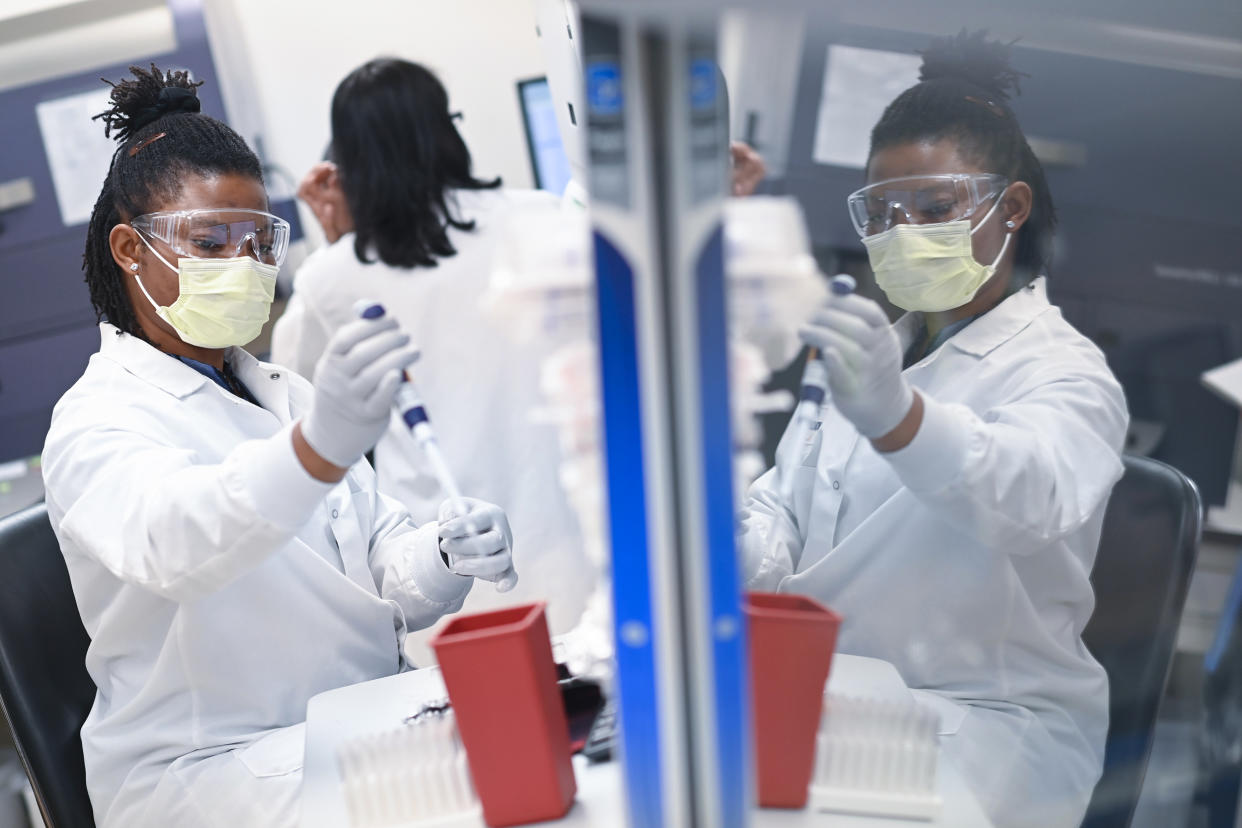CDC advisory panel votes to recommend the Novavax COVID-19 vaccine
A Centers for Disease Control and Prevention advisory panel voted Tuesday to recommend Novavax’s two-dose COVID-19 vaccine for adults.
The Food and Drug Administration authorized the vaccine for emergency use last week, but the CDC must sign off before doses can be distributed to the public. Now that the agency’s advisory panel has weighed in affirmatively, it is up to CDC Director Dr. Rochelle Walensky to endorse the recommendation. In the past, that step has followed within the same day as the committee’s vote.
In a presentation to the advisory panel Tuesday, CDC officials said that people ages 18 and older who are not immunocompromised should get the two doses of Novavax’s vaccine three to eight weeks apart. But those who are immunocompromised should receive two doses three weeks apart.
The U.S. has 3.2 million Novavax doses ready to distribute pending Walensky’s recommendation. The vaccine has already been authorized in more than 40 countries and the European Union. More than 1 million doses had been administered worldwide as of June 30, Novavax said Tuesday.

The shot could fill a gap in the U.S. vaccination push, since it does not use mRNA technology. Around 22% of people in the U.S. still have not received a single COVID-19 vaccine, according to the CDC.
“The primary target population for Novavax will be ... those that are unvaccinated,” Dr. Oliver Brooks, an advisory committee member and the chief medical officer at Watts Healthcare Corp., said after the panel vote.
Novavax’s vaccine stimulates the production of antibodies by introducing the body to a purified spike protein from the coronavirus, along with an immune-boosting ingredient called an adjuvant. The FDA has approved several protein-based vaccines in the past, including one for hepatitis B and another for shingles.
Both Pfizer-BioNTech’s and Moderna’s vaccines, by contrast, were the first mRNA vaccines authorized. They use a snippet of the coronavirus’s genome to instruct the body to produce the spike protein internally, which triggers the development of antibodies.
However, the availability of Novavax shots may not significantly alter U.S. vaccination rates at this point. In a small CDC survey conducted early this year, just 16% of unvaccinated respondents said they would probably or definitely get a protein-based COVID-19 vaccine. And a June survey from Morning Consult found that 77% of unvaccinated adults said they would not get a protein-based COVID-19 shot if one were authorized in the U.S.
Novavax’s vaccine comes with another advantage, though: It can be stored in a regular refrigerator for up to six months, so it’s easier to transport than mRNA vaccines, which must be kept at subzero temperatures.
The efficacy and side effects of Novavax’s vaccine
In a trial group of more than 30,000 people in the U.S. and Mexico, Novavax’s vaccine was found to reduce the risk of symptomatic COVID-19 by 90% and reduce the risk of moderate or severe disease by 100%.
Common side effects included pain or tenderness at the injection site, fatigue, muscle pain and headaches. Fever was extremely rare.
The Novavax shot, like the two mRNA vaccines, carries a small risk of myocarditis, or inflammation of the heart muscle. Novavax’s trials identified three cases of myocarditis that were likely linked to the vaccine, out of more than 41,000 vaccine recipients in the company’s clinical trials worldwide.
The risk of myocarditis is far higher after a COVID-19 infection. Out of 1.45 million people diagnosed with COVID-19 in the U.S. from March 2020 to February 2021, around 5,000 developed myocarditis, according to the CDC.
Because of the myocarditis risk, however, CDC officials said in their presentation Tuesday that people who’ve recently received a monkeypox vaccine but haven’t been vaccinated for COVID-19 might consider waiting four weeks before getting any of the coronavirus vaccines.
Novavax said its shot was found to be highly effective against the alpha variant, but its trials were too early to evaluate efficacy against the omicron variant. The company released additional data in late December, though, which indicated that two doses triggered a strong immune response against the original omicron variant.
The version of omicron that’s now dominant in the U.S., BA.5, appears to evade protection from vaccines more easily than its predecessors. Novavax said Tuesday that it still expects its vaccine to provide good protection against newer omicron subvariants.
This story first appeared on NBCNews.com.
